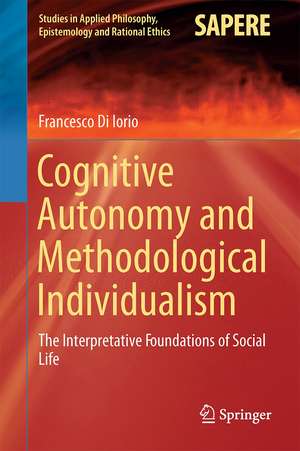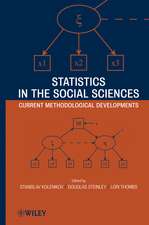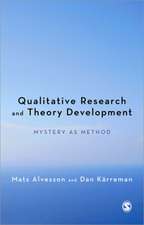Cognitive Autonomy and Methodological Individualism: The Interpretative Foundations of Social Life: Studies in Applied Philosophy, Epistemology and Rational Ethics, cartea 22
Autor Francesco Di Iorioen Limba Engleză Hardback – 10 iun 2015
Barry Smith
University at Buffalo, editor of The Monist
“This impressive and well-researched book breaks new ground in our understanding of F.A. Hayek and of methodological individualism more generally. It shows that methodological individualism sanctions neither an atomistic view of society nor a mechanical determinism. The book carefully analyzes an important tradition in the social sciences, and compares it to many important philosophical, sociological and economic systems of thought. This is an enlightening book for all scholars interested in the methodological problems of the social sciences.”
Mario J. Rizzo
New York University
“One of Hayek’s most important contributions is his linking of complex methodological individualism, which deals with the emergence of spontaneous orders and unintended collective structures in complex self-organizing social systems, with a cognitive psychology. What makes Francesco Di Iorio’s book of great interest is that, by building on Hayek’s seminal book The Sensory Order, it deepens the connections between cognition and rules of just conduct, taking into account relevant theories on subjectivity and consciousness such as phenomenology, hermeneutics and enactivism.”
Jean Petitot
École des Hautes Études en Sciences Sociales, EHESS, Paris
“In this thoughtful and enlightening book Francesco Di Iorio uses Hayek’s cognitive psychology as the starting point for investigation of the relationship between the autonomy of the agent and socio-cultural influences within methodological individualism. The book provides anilluminating and innovative analysis of a central issue in the philosophy of social science by setting Hayek’s view on mind and action in fruitful relation to approaches such as Gadamer’s hermeneutics, Merleau-Ponty’s phenomenology, Varela’s and Maturana’s enaction, Boudon’s interpretative sociology, Popper’s fallibilism and Mises’ praxeology. One of the most interesting aspects of this book is its argument that hermeneutics and fallibilism refer not to two different methods but to the same one.”
Dario Antiseri
Emeritus Professor at LUISS University, Rome
“Francesco Di Iorio’s book explores, in an original way, the connections between Hayek’s methodological individualism and his fascinating idea that human mind is both an interpretative device and a self-organizing system. It is a brilliant, clearly written work, characterized by a certain intellectual courage, which makes a remarkable contribution to the sociology of knowledge.”
Gérald Bronner
Paris Diderot University
| Toate formatele și edițiile | Preț | Express |
|---|---|---|
| Paperback (1) | 382.75 lei 6-8 săpt. | |
| Springer International Publishing – 17 oct 2016 | 382.75 lei 6-8 săpt. | |
| Hardback (1) | 390.08 lei 6-8 săpt. | |
| Springer International Publishing – 10 iun 2015 | 390.08 lei 6-8 săpt. |
Din seria Studies in Applied Philosophy, Epistemology and Rational Ethics
- 20%
 Preț: 603.90 lei
Preț: 603.90 lei -
 Preț: 397.59 lei
Preț: 397.59 lei -
 Preț: 359.54 lei
Preț: 359.54 lei - 20%
 Preț: 989.96 lei
Preț: 989.96 lei - 24%
 Preț: 787.50 lei
Preț: 787.50 lei -
 Preț: 390.08 lei
Preț: 390.08 lei -
 Preț: 370.88 lei
Preț: 370.88 lei - 15%
 Preț: 641.20 lei
Preț: 641.20 lei - 20%
 Preț: 991.60 lei
Preț: 991.60 lei - 20%
 Preț: 646.95 lei
Preț: 646.95 lei - 15%
 Preț: 653.98 lei
Preț: 653.98 lei -
 Preț: 384.48 lei
Preț: 384.48 lei -
 Preț: 395.47 lei
Preț: 395.47 lei - 18%
 Preț: 1216.95 lei
Preț: 1216.95 lei - 18%
 Preț: 947.50 lei
Preț: 947.50 lei -
 Preț: 388.72 lei
Preț: 388.72 lei -
 Preț: 395.09 lei
Preț: 395.09 lei -
 Preț: 394.12 lei
Preț: 394.12 lei - 15%
 Preț: 644.82 lei
Preț: 644.82 lei - 15%
 Preț: 698.15 lei
Preț: 698.15 lei - 18%
 Preț: 1840.91 lei
Preț: 1840.91 lei - 20%
 Preț: 656.84 lei
Preț: 656.84 lei -
 Preț: 389.70 lei
Preț: 389.70 lei - 20%
 Preț: 991.46 lei
Preț: 991.46 lei - 15%
 Preț: 585.73 lei
Preț: 585.73 lei - 15%
 Preț: 711.40 lei
Preț: 711.40 lei - 15%
 Preț: 589.33 lei
Preț: 589.33 lei - 15%
 Preț: 700.42 lei
Preț: 700.42 lei
Preț: 390.08 lei
Nou
Puncte Express: 585
Preț estimativ în valută:
74.64€ • 77.94$ • 61.64£
74.64€ • 77.94$ • 61.64£
Carte tipărită la comandă
Livrare economică 15-29 aprilie
Preluare comenzi: 021 569.72.76
Specificații
ISBN-13: 9783319195117
ISBN-10: 3319195115
Pagini: 200
Ilustrații: XV, 185 p.
Dimensiuni: 155 x 235 x 17 mm
Greutate: 0.46 kg
Ediția:2015
Editura: Springer International Publishing
Colecția Springer
Seria Studies in Applied Philosophy, Epistemology and Rational Ethics
Locul publicării:Cham, Switzerland
ISBN-10: 3319195115
Pagini: 200
Ilustrații: XV, 185 p.
Dimensiuni: 155 x 235 x 17 mm
Greutate: 0.46 kg
Ediția:2015
Editura: Springer International Publishing
Colecția Springer
Seria Studies in Applied Philosophy, Epistemology and Rational Ethics
Locul publicării:Cham, Switzerland
Public țintă
ResearchCuprins
Introduction.- The Interpretative Nature of Knowledge: Hermeneutics and Sensory Order.- From Cognitive Autonomy to the Criticism of Socio-Cultural Determinism.- Human Autonomy and Social Systems.- Rationality and Collective Beliefs.- Nomological Explanation and Empirical Control in the Social Sciences.
Textul de pe ultima copertă
“Di Iorio offers a new approach to Hayek’s Sensory Order, linking neuroscience to the old Verstehen tradition and to contemporary theories of self-organizing systems; this should be on the reading list of everyone who is interested in Hayek’s thought.”
Barry Smith
University at Buffalo, editor of The Monist
“This impressive and well-researched book breaks new ground in our understanding of F.A. Hayek and of methodological individualism more generally. It shows that methodological individualism sanctions neither an atomistic view of society nor a mechanical determinism. The book carefully analyzes an important tradition in the social sciences, and compares it to many important philosophical, sociological and economic systems of thought. This is an enlightening book for all scholars interested in the methodological problems of the social sciences.”
Mario J. Rizzo
New York University
“One of Hayek’s most important contributions is his linking of complex methodological individualism, which deals with the emergence of spontaneous orders and unintended collective structures in complex self-organizing social systems, with a cognitive psychology. What makes Francesco Di Iorio’s book of great interest is that, by building on Hayek’s seminal book The Sensory Order, it deepens the connections between cognition and rules of just conduct, taking into account relevant theories on subjectivity and consciousness such as phenomenology, hermeneutics and enactivism.”
Jean Petitot
École des Hautes Études en Sciences Sociales, EHESS, Paris
“In this thoughtful and enlightening book Francesco Di Iorio uses Hayek’s cognitive psychology as the starting point for investigation of the relationship between the autonomy of the agent and socio-cultural influences within methodological individualism. The book provides anilluminating and innovative analysis of a central issue in the philosophy of social science by setting Hayek’s view on mind and action in fruitful relation to approaches such as Gadamer’s hermeneutics, Merleau-Ponty’s phenomenology, Varela’s and Maturana’s enaction, Boudon’s interpretative sociology, Popper’s fallibilism and Mises’ praxeology. One of the most interesting aspects of this book is its argument that hermeneutics and fallibilism refer not to two different methods but to the same one.”
Dario Antiseri
Emeritus Professor at LUISS University, Rome
“Francesco Di Iorio’s book explores, in an original way, the connections between Hayek’s methodological individualism and his fascinating idea that human mind is both an interpretative device and a self-organizing system. It is a brilliant, clearly written work, characterized by a certain intellectual courage, which makes a remarkable contribution to the sociology of knowledge.”
Gérald Bronner
Paris Diderot University
Barry Smith
University at Buffalo, editor of The Monist
“This impressive and well-researched book breaks new ground in our understanding of F.A. Hayek and of methodological individualism more generally. It shows that methodological individualism sanctions neither an atomistic view of society nor a mechanical determinism. The book carefully analyzes an important tradition in the social sciences, and compares it to many important philosophical, sociological and economic systems of thought. This is an enlightening book for all scholars interested in the methodological problems of the social sciences.”
Mario J. Rizzo
New York University
“One of Hayek’s most important contributions is his linking of complex methodological individualism, which deals with the emergence of spontaneous orders and unintended collective structures in complex self-organizing social systems, with a cognitive psychology. What makes Francesco Di Iorio’s book of great interest is that, by building on Hayek’s seminal book The Sensory Order, it deepens the connections between cognition and rules of just conduct, taking into account relevant theories on subjectivity and consciousness such as phenomenology, hermeneutics and enactivism.”
Jean Petitot
École des Hautes Études en Sciences Sociales, EHESS, Paris
“In this thoughtful and enlightening book Francesco Di Iorio uses Hayek’s cognitive psychology as the starting point for investigation of the relationship between the autonomy of the agent and socio-cultural influences within methodological individualism. The book provides anilluminating and innovative analysis of a central issue in the philosophy of social science by setting Hayek’s view on mind and action in fruitful relation to approaches such as Gadamer’s hermeneutics, Merleau-Ponty’s phenomenology, Varela’s and Maturana’s enaction, Boudon’s interpretative sociology, Popper’s fallibilism and Mises’ praxeology. One of the most interesting aspects of this book is its argument that hermeneutics and fallibilism refer not to two different methods but to the same one.”
Dario Antiseri
Emeritus Professor at LUISS University, Rome
“Francesco Di Iorio’s book explores, in an original way, the connections between Hayek’s methodological individualism and his fascinating idea that human mind is both an interpretative device and a self-organizing system. It is a brilliant, clearly written work, characterized by a certain intellectual courage, which makes a remarkable contribution to the sociology of knowledge.”
Gérald Bronner
Paris Diderot University
Caracteristici
Links methodological individualism with the enactive paradigm of cognitive science Uses the theory of the mind as a complex self-organizing system to defend the interpretative approach of methodological individualism Criticizes the idea that the hermeneutical approach and scientific explanation are two alternative approaches, thus defending the unity of science Focuses on the non-atomistic variant of methodological individualism Includes supplementary material: sn.pub/extras
















